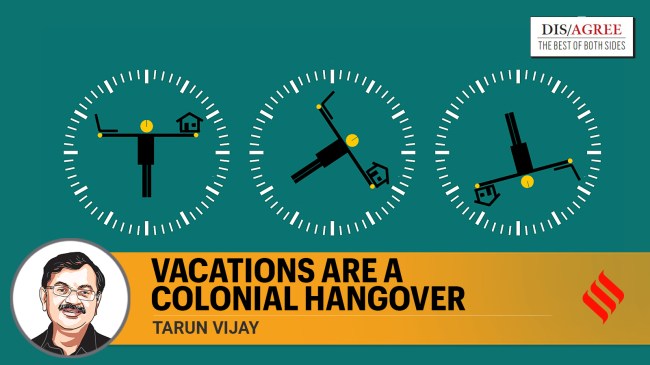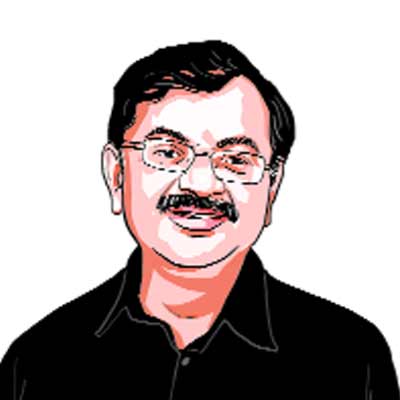Opinion Best of Both Sides: 90-hour work week isn’t always bad: Holidays and vacations are colonial hangover
Employers must not blindly give in to suggestions to reduce work hours. As a poor country, India’s needs are different from the West
 The vacation mania is a colonial hangover. (Illustration by C R Sasikumar)
The vacation mania is a colonial hangover. (Illustration by C R Sasikumar) It is sad to see that well-meaning thought leaders have misinterpreted Larsen and Toubro Chairman S N Subrahmanyan’s advice on a 90-hour work and ascribed an extreme position to his comments. I have closely observed the phenomenal growth of L&T in the past two decades. I have also met people who shaped the company – they have confided about refusing offers of salaries 10 times higher than what they received at L&T because of the warm family-like work atmosphere in the company. This can’t happen in an organisation driven by a workaholic ethos. Subrahmanayan’s organisation has taken up several tasks, including the construction of the Ram temple, that may have appeared difficult to begin with and accomplished them with aplomb.
From the Bhagwad Gita to the Constitution, vacations have never been considered a right or an essential part of the country’s work culture. Karmayogis have been the country’s ideals, not vacation bhogis. People were known to devote themselves to work till they completed their duties and were ready to renounce the worldly pleasures – the vanaprastha ashram. The holiday craze is something we have blindly copied from the West.
The country’s ethos instead is rooted in vidya that liberates — sa vidya ya vimuktaye. In other words, the work of education is to enable people to choose a life, a job of their choice. When people love their work, they find joy in being involved in it – they are completely immersed in it. Otherwise, even an eight-hour work schedule in a day becomes torture.
To me, the message in Subrahmanyan’s statement was work is worship and people need to enjoy the journey towards the goal. My mentor in Panchjanya would often say, if you take your work lightly, you will never reach the goal. On several occasions, we worked continuous night shifts and reached our edit desks the next morning without even a murmur of complaint. The prayer hall in schools would boldly display the motto, “Karm Hi Puja Hai, Araam Haraam Hai”. This slogan of the Sixties made its way to several Bollywood songs.
The country has a prime minister who never takes a day off. He works even when on long, tiring flights — from Rio to Delhi, for instance, after having completed the New York leg of his visit. Several times, he has addressed a rally after a long flight in which he may have worked on several files. He is an ideal leader for the millions. Are they wrong in looking up to him?
Do we remember who said the famous lines, “Arise, awake and stop not till the goal is reached”? A saffron-robed monk who rejuvenated the Indian youth and revived the nation’s glory through a Hindu thought revolution. He did not say “Arise, awake and take a vacation to Mauritius to rejuvenate yourself”.
The vacation mania is a colonial hangover. It speaks of a mindset that was ingrained into people during British rule. It was a culture that did not encourage people to work diligently and tirelessly to achieve targets. Instead, it required them to slavishly imitate the traditions and ways of the colonial masters. Today, state governments declare local festivals as public holidays as if giving freedom from work will please more people and translate into votes for their parties. Several times, five to six days of continuous holidays are “gifted” away causing enormous loss to the economy and putting public work in jeopardy. In a country like India with the largest number of poor in the world, people must work hard. By becoming a global manufacturing hub, the country can raise the living standards of its people. But many people do not appreciate this necessity and advocate holidays.
In India, governments declare birthdays and death anniversaries of community leaders as public holidays hoping to garner votes for their parties. Freedom from karma is the new craze. We need not look far for a comparison: We know how vacation-loving trade unions ruined West Bengal’s economy and its work culture. And, Gujarat became the preferred destination for entrepreneurs under the “work hard” ethos encouraged by Modi. By mocking Subrahmanyan’s innocuous suggestion, his critics have pushed the debate in the wrong direction. They seem to have made the common hard-working person a laughing stock. Lakhs of people in the unorganised sector work from the crack of dawn to late evening – the sabji vendor, for instance, begins his day as early as 4 am, loads his stuff on a cycle or a rehri and returns home after 10. Do we want to make him feel he is wasting his life by not enjoying a weekend? Earning two times meals for a family remains a very tough job in the country. Employers need to respect such work, rather than blindly carrying out suggestions for reduced working hours. Let the economy rise to a level where poverty is completely eliminated. The working hours will be adjusted according to standards of life. Till then Aaram Haraam Hai.
The writer is a former Rajya Sabha MP from the BJP




